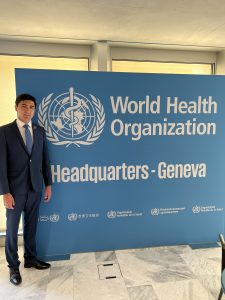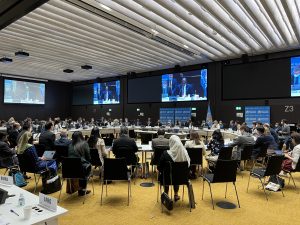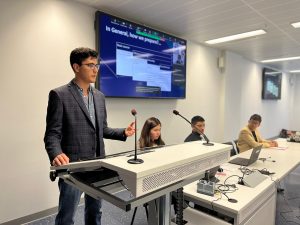By guest bloger Andrés Quintero Leyra, MSc Health Policy, Planning and Financing at the Department of Health Policy
Between 22-28 May, I had the opportunity to participate in the 75th World Health Assembly (WHA) in Geneva, Switzerland as a delegate for the International Federation of Medical Students‘ Associations. This is my second time attending the WHA since 2019.
The annual WHA is the highest-level meeting in international Health policy. A variety of different actors are invited to participate in different roles and levels of involvement.
How did the MSc Health Policy, Planning and Financing help me be a part of the event?
My experience at the WHA benefited greatly from my programme of study at LSE, the MSc Heath Policy, Planning and Financing, run jointly with the London School of Hygiene and Tropical Medicine (LSHTM).
The programme strengthened my recognition of the importance of health policy, and the processes of power dynamics that exist in bodies like the World Heath Organisation. It gave me knowledge and technical expertise to probe into the procedures, implications and incentives behind decision making, and challenges facing health policy making. These have been put into context and practice in my conversations with stakeholders at the WHA, and in defence of the position of the organisation I was representing.
Looking back to my experience of WHA in 2019, I have become more confident in utilising both the technical knowledge and practical skills in the process of lobbying and collaborating with stakeholders for a mutually beneficial decision. This marks a major step of my understanding and practice of health policy decision making.
Who can participate in the World Health Assembly and how?
All nations across the globe send delegations to be present in the negotiations and activities of the event. All member states have voice and vote in the decisions and resolutions that the WHA adopts.
Non-state actors with official relations with the WHO also have a seat in the room – academic bodies, civil society organisations, and those who have fulfilled the requisites to be considered with enough relevance for people they represent or the level of impact of their activities. This includes professional organisations such as medical associations, associations of patients, networks of collaborations for specific diseases, etc.
Other agencies and multilateral organisations are part of the event as well – such as the WHO regional offices, and directors of UN agencies related to health including UNAIDS, GAVI, ILO, representatives from the World Bank, the Global Fund, the ICRC/IFRC, and so on.
Finally, an important actor for the economic power held in discussions are funders and private industry representatives, including the Bill and Melinda Gates Foundation.
Who was I representing?
In this year’s meeting, I have been representing the International Federation of Medical Students’ Associations (IFMSA). As an alumnus of this organisation and previous delegate, I was involved in a strategic position to support young delegates with how the IFMSA could represent young voices from health professionals in an important meeting like the WHA.
My primary area of focus was on the Human Resources for Health Advocacy Working group that prepared statements, meetings with WHO officials, and other relevant stakeholders. In addition, I am part of the delegation working actively to promote the creation of Youth Delegate programmes among the member states. Forty young advocates from around the world were part of the delegation. We were all very much looking forward to the next chapter of including more youth perspectives in the discussions.
The Department of Health Policy at LSE ranked 1st overall in REF 2021 amongst UK institutions submitted under designated Unit of Assessment.








